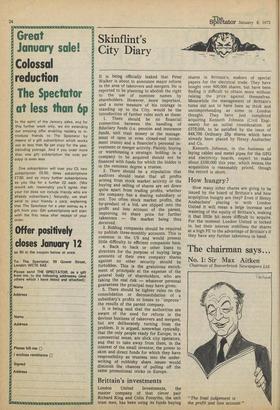Skinflint's City Diary
It is being officially leaked that Peter Walker is about to announce major reform in the area of takeovers and mergers. He is reported to be planning to abolish the right to the use of nominee names by shareholders. However, more important, and a surer measure of his courage in standing up to the City, would be the introduction of further rules such as these: 1. There should be no financial connection between the handling of fiduciary funds (i.e. pension and insurance funds, unit trust money or the manage ment of open or even closed-end investment trusts) and a financier's personal in vestment or merger activity. Plainly, buying or warehousing a strategic holding in a company to be acquired should not be financed with funds for which the bidder is in the remotest degree a trustee.
2. There should be a stipulation that auditors should insist that all profits arising from stock market activity or the buying and selling of shares are set down quite apart from trading profits, whether the company has a dealing subsidiary or not. Too often stock market profits, the by-product of a bid, are slipped into the profit and loss account of the parent, improving its share price for further takeovers — the market being thus deceived.
3. Bidding companies should be required to publish three-monthly accounts. This is common in the US and would present little difficulty to efficient companies here.
4. Back to back or other loans to directors for the purpose of buying large amounts of their own company shares against no other security should be forbidden. This is the gratuitous enrichment of principals at the expense of the general body of shareholders, who are taking the real risk — whatever personal guarantees the principal may have given.
5. There should be tighter rules on the consolidation or deconsolidation of a subsidiary's profits or losses to ' improve ' the results of the parent company.
It is being said that the authorities are aware of the need for reform in the devious business of takeovers and mergers, but are deliberately turning from the problem. It is argued, somewhat cynically, that the only people ready for Europe, in a commercial sense, are slick city operators, and that to take away from them, in the interest of the small investor, the power to skim and direct funds for which they have responsibility as trustees into the underwriting of rubbishy share issues would diminish the chances of pulling off the same promotional tricks in Europe.
Brittain's investments
London United Investments, the master company of that clever pair Richard King and Colin Forsythe, the unit trust men, has been using its funds buying shares in Brittain's, makers of special papers for the electrical trade. They have bought over 800,000 shares, but have been finding it difficult to obtain more without raising the price against themselves. Meanwhile the management of Brittain's turns out not to have been as thick and uncomprehending as some in London thought. They have just completed acquiring Kenneth Johnson (Civil Engineers) for an initial consideration of 075,000, to be satisfied by the issue of 848,700 Ordinary 25p shares which have already been placed by Henry Ansbacher and Co.
Kenneth Johnson, in the business of laying cables and metal pipes for the GPO and electricity boards, expect to make about E100,000 this year, which means the acquisition is reasonably priced, though the record is short.
How hungry?
How many other shares are going to be issued by the board of Brittain's and how acquisition hungry are they? Even if Henry Ansbachers' placing is with London United it will mean a large increase and watering of the equity of Brittain's, making it that little bit more difficult to acquire. For the moment London United is locked in, but their interest stabilises the shares at a high PE to the advantage of Brittain's if they have any further takeovers in hand.

































 Previous page
Previous page